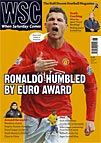 Goal celebebrations in Brazil are becoming ever more choreographed and controversial, writes Robert Shaw
Goal celebebrations in Brazil are becoming ever more choreographed and controversial, writes Robert Shaw
One of the best-known and most imitated goal celebrations is Bebeto’s baby-rocking tribute to newly born son Matheus during the 1994 World Cup game with Holland. This season a different Bebeto’s post-goal antics were received with less popular acclaim in Brazil.
In a game in the Santa Catarina state championship in March, Avaí striker Bebeto was said to have provoked fans of opponents Figueirense by turning his back, pointing at his number and motioning at them to be silent after an injury-time goal. Other team-mates joined in a rendition of a popular funk dance, Dança do Créu, and helped to trigger a confrontation between players that threatened to spill over into the stands at Figueirense’s stadium. The dance swept Brazilian football earlier this season and generated widespread press comment about the propriety of this thrusting tribute of a thinly disguised sexual nature.
Sergio Correa, president of the National Commission of Referees, warned that public order was at risk in the country’s football stadia if fans transplanted the culture of bailes de funk – large-scale parties usually held in the city’s favelas. Correa noted: “The dance is already on TV, in the musical world spreading as popular culture can in a democratic way, but you can’t go to an opponent or rival fans in a way that could provoke a problem as it did in Avaí versus Figueirense.”
Hamburg’s Thiago Neves was at the centre of a similar storm earlier this year while playing for his previous club, Fluminense. Neves directed his version of the dance at Flamengo fans on the wrong end of a beating in a Fla-Flu derby, attracting near-universal media flak.
Flamengo themselves had been accused of attempting to get under the skin of opposing players and fans with their own celebrations. Striker Souza tried to compensate for his own lack of goals, and an earlier association with bitter rivals Vasco, with mock crying designed to taunt opponents Botafogo, whose players and directors had been reduced to tears in a press conference by the laughably bad refereeing performance in a earlier Taça Rio final defeat by Flamengo.
Concern about goal-related disorder was evident in the decision of the referee to call the Vasco and Fluminense teams together prior to the Taça Rio semi-final in March, in the fashion of a boxing referee, to ask for a good, clean game and in particular for minimal provocation.
Imitation and high-kicking choreography tend to displace wit and spontaneity in Brazilian goal celebrations. Players are routinely quizzed by reporters as to whether they have any novel celebrations lined up for their next goal and they get plenty of time to practice routines while idling away hours in the pre-match seclusion known as concentração.
Some prefer to reintroduce past classics. Cruzeiro striker Guilherme’s leap skyward and air punch is a direct imitation of Pelé, although he will need to score another thousand or so goals to match his mentor. Meanwhile, Júnior Amorim of Maceió team CRB favours the simulated telephone calls made from pitchside police cabins which were associated with such players as Brazil winger Viola at Corinthians in the 1990s.
There are numerous religious tributes – in general by the evangelical rather than the Catholic sector of Brazilian football –and plenty of personal quirks. Fluminense’s Conca, for example, basks in the after-goal glow while tugging his ears to indicate that he is pretending to be an elephant, an extrovert display that would be more explicable if the reserved Argentine was not so clam-like in post-match interviews. In some cases players have made their mark by refusing to celebrate. Alex Mineiro’s silent protest after scoring a penalty in his team’s 5-2 defeat by Flamengo spoke volumes about problems at Palmeiras. The gesture was seen as a message to fans in response to an assault on coach Vanderlei Luxemburgo in São Paulo’s Congonhas airport en route to Rio de Janeiro.
This, though, was a rare moment of restraint in an era when Brazilian players are expected to show as much flair after the ball hits the back of the net as they are in putting it there in the first place.
From WSC 263 January 2009